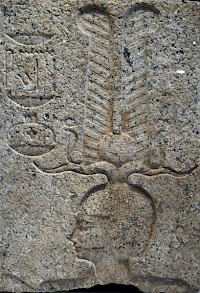Diadochi 1: The Babylon Settlement
Diadochi ("successors"): name of the first generation of military and political leaders after the death of the Macedonian king and conqueror Alexander the Great in 323 BCE. To settle the question whether his empire should disintegrate or survive as a unity, and, if so, under whose rule, they fought several full-scale wars. The result, reached by 300, BCE, was a division into three large parts, which more or less coincided with Alexander's possessions in Europe, Asia, and Egypt.
During the next quarter of a century, it was decided whether these states could endure. As it turned out, there were no great territorial changes, although there were dynastic changes. After 280, the period of state-forming came to an end with three great states: Antigonid Macedonia, Ptolemaic Egypt, and the Seleucid kingdom in Asia.

Alexander died in the afternoon of 11 June 323 BCE, in Babylon. Next day, his generals met to discuss the new situation. Under normal circumstances, they, as representatives of the Macedonian nation, had to choose a new king, and the obvious candidate would be the brother of the dead king, Arridaeus. However, he was illegitimate, epileptic, and considered mentally unfit to rule. As a consequence, it was difficult to reach a solution.
Perdiccas, the commander of the Companion cavalry who had been appointed by Alexander as his successor, said that it was best to wait until queen Roxane, who was pregnant, had given birth. If it were a son, it would be logical to make him king. This was all too transparent: Perdiccas wanted to be in sole command until the boy had grown up.
Nearchus, the commander of the navy, pointed out that Alexander already had a three year old son, Heracles, the son of his former concubine Barsine. Everyone could see through this proposal: Nearchus was married to a daughter of Barsine, and would, as the future king's brother-in-law, suddenly be very influential.
The next speaker was Ptolemy, one of Alexander's personal friends. He objected to the idea that a son of Roxane or Barsine would be king of Macedonia. Those boys were mere half-breeds. His proposal was that the most important decisions were to be taken by those present, as some kind of collective leadership. This proposal, in fact a compromise, received some support.
However, the commander of the phalanx, Meleager, objected and sided with Arridaeus. He was supported by the foot soldiers, who hated Alexander's oriental policy and preferred Arridaeus, who was not of Persian blood. Another reason for their choice may have been that they wanted the empire to be a unity, whereas Perdiccas and the other cavalry commanders seemed to be aiming at a division of the kingdom. (Go here for Curtius Rufus' account of the meeting.)
The situation was tense, as it seemed that Meleager's soldiers wanted to fight for Arridaeus against Perdiccas and his adherents. That would mean a war between the infantry and the cavalry. Although violence was used and Meleager was killed, the cooler heads on both sides improvised a compromise. Perdiccas was to be regent for king Arridaeus and Roxane's son (if the baby were a son, of course). Seeing that this was the only way to prevent civil war, everybody agreed. Arridaeus became king under the name of Philip III, and when Roxane's baby turned out to be a son, he became king Alexander IV. Perdiccas was made regent for the fool and the infant and appointed the generals as satraps (text). To make the situation less complex, Alexander's second wife Statira was murdered.
But war had become inevitable. When the Athenians heard that Alexander had died, they revolted (autumn 323). They had been preparing the war for some time and were joined by several other Greek towns. They occupied Thermopylae, and when the Macedonian commander Antipater arrived, he was repelled and forced to hide in the nearby fortress of Lamia. In the spring, Leonnatus, the satrap of Hellespontine Phrygia, was able to relieve him, but he was killed in action and the war continued.
In the summer, however, Craterus arrived. He had once been Alexander's most capable general and had been appointed as commander in Europe. His orders were to lead back 11,500 veterans and to build a navy in Cilicia (to be used when Alexander attacked Carthage). Craterus used the fleet and the veterans, and defeated his enemies at Crannon (5 September 322) This was the end of the Lamian War. The Greek cities, which had been free allies during Alexander's reign, were from now on treated as Macedonian subjects. It also meant the end the Athenian democracy.
At the same time, the Greek veterans who had been forced by Alexander to live in punitive colonies in the eastern satrapies (Bactria and Sogdia), decided to fight themselves a way back to Greece. They were defeated by a Macedonian army commanded by Peithon, the newly appointed satrap of Media, and sent back (text). For the time being, all remained quiet in the east, but many Europeans had died, and the grip of the survivors on the eastern periphery - not too tight already - was weakened. In 316, the Indian king Chandragupta Maurya could conquer the Indus valley.
In 322, it seemed that the empire would remain quiet and united. However, the centrifugal forces were already at work, and within a few months, the unity was shattered.